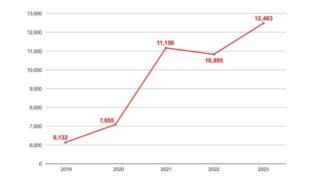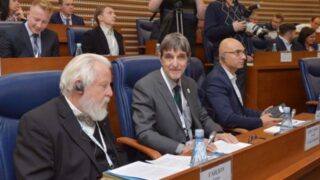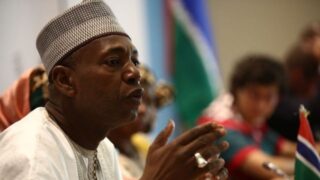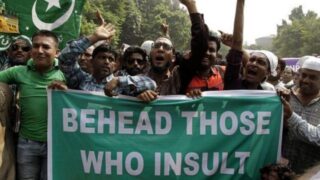Silence, misrepresentation, and fake news transform one the most important allies of religious freedom into a pervasive and obnoxious enemy.
by Marco Respinti*
*Remarks and further reflections for the panel “The Importance of IRF Education and Awareness” of February 1, 2023, part of “Plenary 2: It Will Take Us All” of the 3rd annual International Religious Freedom (IRF) Summit 2023, co-chaired in Washington, D.C., by Sam Brownback, former US Ambassador-at-Large for International Religious Freedom, and Katrina Lantos Swett, former chair of the US Commission on International Religious Freedom. The author was interviewed by Tina Ramirez, founder of Hardwired Global, alongside Aaron Sherinian, CEO of Radiant Foundation.
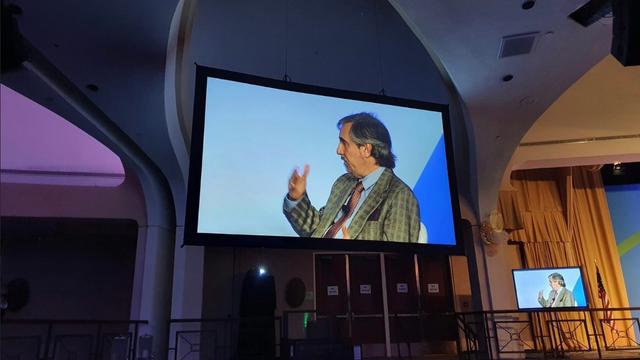

What does it mean to educate to international religious freedom (IRF)?
First, let me underline the value of religious freedom. Religious freedom is the first and most fundamental human liberty. In fact, it concerns the most important of all questions, which different religions and spiritual paths call the question about God, the Creator, the Supreme Being, or the infinite transcendent unity of the universe. It even concerns atheism. In sum, in one way or another, it concerns the ultimate reality of all that is around us, and of ourselves too. Since it is the basics of life, religious freedom is also the very foundation of every other human liberty. If people are free to decide that God exists, or does not exist, they are consequently free to live according to that belief and to enjoy all other liberties. If instead people are denied the freedom to decide on the first, basic question in life, all their liberties slip away: in one form or another, they are curtailed or neglected.
We speak of international religious freedom because religious freedom has a monumental international meaning and value. Since religious freedom is the first and most fundamental human liberty, it is self-evident why religious liberty is also fundamental at an international level.
If all this is true, religious freedom is also the first political human right, because it has a fundamental social dimension. When we speak of religious liberty, we do not address only the liberty of believing in private: we speak of the essential liberty to live our own faith publicly, and to organize our lives according to the tenets and dogmas of our religions, if those tenets and dogmas do not violate the law and, more importantly, do not infringe natural law.
To educate to IRF means to nurture people, and especially the rising generations, with this good food for the brain and the heart. We will have far better citizens of the world when they come to realize that granting to others the freedom to worship and to live according to their faith means to grant them the right to the truth. Religious freedom does not mean that all religions are the same: it means that truth matters, and this is what religion and the sense of the sacred are all about. Every man and woman has the right to know the truth, but only full freedom allows them to progress in that direction.


Too many people still perceive religious freedom as a non-value because they misunderstand it for a whole range of different things that have nothing to do with it. We need to teach them back, with the courage to reconnect religious freedom with the essential quest for the truth that, consciously or not, openly or not, animates every single human being at all times and in all places. Those who violate the religious freedom of others violate the right to the truth of all, starting from themselves. In other words, to defend our right to the truth, we should protect the religious freedom of everybody else. Deny religious freedom to others, and you will have betrayed the very truth you believe in.
Media may be a great ally in upholding and defending religious liberty. But can they sometimes be instead an obstacle to IRF?
Media are the means to communicate truth. If they don’t, they became precious tools in the hands of persecutors. Let me just suggest three staggering and blatant examples.
Nigeria is my first example. Christians are regularly slaughtered there. Perhaps in what is the first African country in terms of population, a genocide is taking place. But too many media refuse to call perpetrators by their names, mostly Boko Haram and the Fulani extremists, and instead ridiculously blame what is happening on global warming. This is the worst thing that journalism can possibly do: hide the truth.
China is my second example. The Chinese regime persecutes every single religion, some of them openly, some of them more subtly. Yet many journalists, specifically in the West, just repeat the fake news systematically fabricated and spread by the Chinese Communist Party’s propaganda machine. It happens more often than many may believe, sometimes also as a consequence of official political agreements. Italy, my country, is a case study here. Many NGOs and researchers have documented the infiltration of Italian media by the CCP as a consequence of the 2018 Memorandum of Understanding signed by Rome and Beijing, which was a blank check in the hands of the Chinese regime. For political interest and money, many journalists remain silents on Chinese crimes. This is again the worst thing that journalism can possibly do: hide the truth.


My third and last example is Japan. Former Japanese Prime Minister Abe Shinzo (1954–2022) was assassinated by a man who claimed that his mother, a member of the Unification Church (now called Family Federation for the World Peace and Unification), had been ruined by her excessive donations to the church. The assassin wanted to punish Abe for his participation in initiatives connected with that church. The incident led to an orchestrated and politically motivated campaign against the Unification Church that quickly escalated to calls to liquidate it as a religious organization and to pass laws against “cults” that would affect many other religions as well. This campaign is supported by an incredible amount of slander and false information, which uses the usual old trick to label as “cults” groups that for whatever reason are not popular.
But the word “cult,” and its equivalents in languages other than English, have no recognized standard and scholarly meaning or use. They are just a way to destroy others. Unscrupulous media help weaponizing this language to destroy the reputation and even the lives of thousands. Some cases speak for themselves: the discrimination through media slander and ill-founded tax bills of the Tai Ji Men movement in Taiwan, the bloody persecution of The Church of Almighty God in Communist China, the administrative discrimination and media campaigns against the Church of Scientology and other groups labeled as “cults” in the West.
This is always the worst thing that journalism can possibly do: hide the truth.


